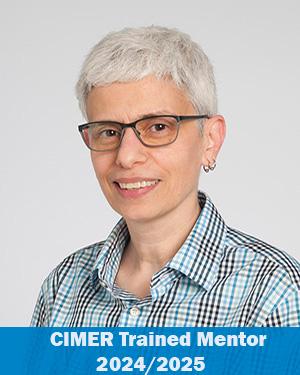Adeline (Lynn) Hajjar Laboratory
-
Adeline (Lynn) Hajjar Laboratory
- Principal Investigator
- Research
- Our Team
- Publications
- Careers
- Research News

Adeline (Lynn) Hajjar, DVM, PhD
Staff
Director of Gnotobiotics Facility
Email: [email protected]
Location: Cleveland Clinic Main Campus
Research
Humans are in constant contact with the collection of microorganisms that live in and on us called microbiota. These interactions are essential to our health although perturbations in the mix of microbiota or the products they produce can lead to disease. How this happens is complex and poorly understood for most diseases; however, the use of germfree mice, i.e. mice that are sterile and totally devoid of all microbial life, has aided in determining mechanisms of action. The Gnotobiotics Facility provides resources and support to perform studies where the role of distinct microbial members can be determined. In the Hajjar Lab, we study how microbiota alter immunity by using germfree mice and introducing different collections of microbiota to determine which ones alter immune responses. Currently, we are studying how the gene mutated in cystic fibrosis selects for different microbiota that then drive changes in barrier function and immune responses.
Biography
Adeline (Lynn) Hajjar, DVM, PhD, is Director of the Gnotobiotics Facility in the Center for Microbiome and Human Health at the Lerner Research Institute. She is also Associate Staff in the Department of Cardiovascular and Metabolic Sciences and Associate Professor of Molecular Medicine in the Cleveland Clinic Lerner College of Medicine.
Dr Hajjar was born in Beirut, Lebanon and initially came to the US in 1975 due to the civil war and moved here permanently during college. She earned her DVM from the University of Illinois, Urbana, and her PhD from the Department of Microbiology at the University of Washington, Seattle. She remained at the University of Washington for postdoctoral training in the Department of Immunology and established an independent laboratory in 2009 in the Department of Comparative Medicine. She also helped establish and then became the director of the gnotobiotics core at the University of Washington, before joining the Cleveland Clinic in 2018. Dr Hajjar has over 20 years of research experience concentrating in areas of Toll-like receptor biology and inflammatory responses as well as mouse models of infection, including Pseudomonas aeruginosa, Salmonella enterica serovar Typhimurium, Yersinia pestis, and Bordetella pertussis, with a particular interest in overcoming mouse-human differences in innate immunity by creation of humanized mouse models. In addition to her service duties, she currently maintains a small research laboratory investigating the role of the gut microbiome in cystic fibrosis.
In her free time, Lynn loves to eat and can be found searching for that perfect poke bowl. She also enjoys bird-watching and going for walks with her dog and wife, and even one cat in a stroller.
Education & Professional Highlights
Appointed
2018
Graduate School - University of Washington
Microbiology
Seattle, WA USA
1995
Residency - University of Washington
Seattle, WA USA
1992
Veterinary School - University of Illinois
Urbana, IL USA
1988
Undergraduate - University of Illinois
Urbana, IL USA
1986
Research
Research Overview
Host-microbiota interactions are an indisputable component of homeostasis and uncovering how the host selects for a distinct microbiota as well as how the microbiota alters the host inflammatory responses has been a recent research direction for our lab. By performing fecal-microbiota transplants (FMT) into our germfree cystic fibrosis (CF) mouse model compared to non-CF mice we demonstrated that the CF gut selects for unique microbiota and that these in turn alter the balance of Th17/Treg immune cells. We aim to define the mechanisms and consequences of this selection, to determine whether and how to alter the selection, and ultimately to develop new treatment approaches aimed at manipulating the microbiota to lessen the consequences of pathogenic inflammation in CF.
Our Team
Selected Publications
View publications for Adeline (Lynn) Hajjar, DVM, PhD
(Disclaimer: This search is powered by PubMed, a service of the U.S. National Library of Medicine. PubMed is a third-party website with no affiliation with Cleveland Clinic.)
CFTR dysregulation drives active selection of the gut microbiome. Meeker SM, Mears KS, Sangwan N, Brittnacher MJ, Weiss EJ, Treuting PM, Tolley N, Pope CE, Hager KR, Vo AT, Paik J, Frevert CW, Hayden HS, Hoffman LR, Miller SI, Hajjar AM. PLoS Pathogens 16(1):e1008251, 2020. PMC6994172
Ferreting out the role of infection in cystic fibrosis lung disease.Hoffman LR, Hajjar AM. Am J Respir Crit Care Med197:1243-1244, 2018.
Expression level of human TLR4 rather than sequence is the key determinant of LPS responsiveness. Hajjar AM, Ernst RK, Yi J, Yam CS, Miller SI. PLoS One12(10):e0186308, 2017. PMC5636155
Bordetella pertussis lipid A recognition by Toll-like receptor 4 and MD-2 is dependent on distinct charged and uncharged interfaces. Maeshima N, Evans-Atkinson T, Hajjar AM, Fernandez RC. J Biol Chem290:13440-13453, 2015. PMC4505591
Humanized TLR7/8 expression drives proliferative multisystemic histiocytosis in C57BL/6 mice.Snyder JM, Treuting PM, Nagy L, Yam C, Yi J, Brasfield A, Nguyen LPA, Hajjar AM. PLoS One9(9):e107257, 2014. PMC4168129
Temporal and anatomical host resistance to chronic Salmonella infection is quantitatively dictated by Nramp1 and influenced by host genetic background. Loomis WP, Johnson ML, Brasfield A, Blanc MP, Yi J, Miller SI, Cookson BT, Hajjar AM. PLoS One9(10):e111763, 2014.PMC4211889
Humanized TLR4/MD-2 mice reveal LPS recognition differentially impacts susceptibility to Yersinia pestis and Salmonella enterica. Hajjar AM, Ernst RK, Fortuno III ES, Brasfield AS, Yam CS, Newlon LA, Kollmann TR, Miller SI, Wilson CB. PLoS Pathog, 8(10):e1002963, 2012. PMC3469661
Human Toll-like receptor 4 recognizes host-specific LPS modifications. Hajjar AM*, Ernst RK*, Tsai JH, Wilson CB§, Miller SI§. Nature Immunol3:354-359, 2002. *contributed equally, §shared senior authorship.
Careers
Training at Lerner Research Institute
Our education and training programs offer hands-on experience at one of the nationʼs top hospitals. Travel, publish in high impact journals and collaborate with investigators to solve real-world biomedical research questions.
Learn MoreResearch News

The grant will explore the critical link between microbial pathways and the development of cardio-metabolic diseases.